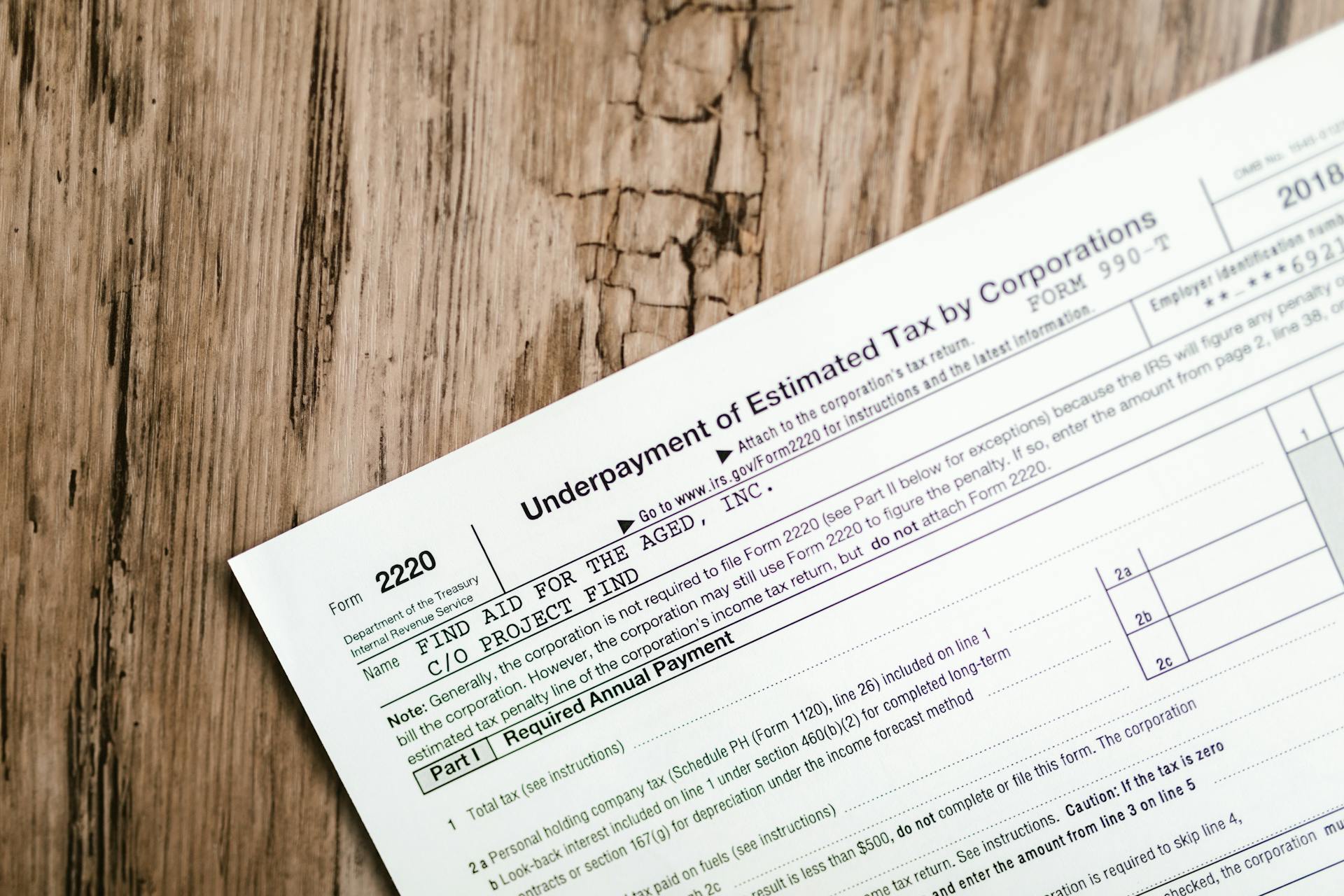
Raising corporate taxes can be an effective way to reduce income inequality. This is because corporations often pay lower tax rates than individuals, allowing them to shift their tax burden to workers.
Studies have shown that in the United States, the top 0.1% of earners receive 23% of their income from capital gains, which are taxed at a lower rate than wages. This creates a system where the wealthy are more likely to benefit from tax breaks.
Raising corporate taxes can help to reduce the gap between the rich and the poor. By increasing the tax burden on corporations, the government can generate more revenue to fund social programs and reduce income inequality.
Consider reading: How to Reduce Business Taxes
Arguments for Increasing Corporate Taxes
Increasing the corporate tax rate can help offset the costs of infrastructure projects and other investments. The White House estimates that raising the corporate tax rate to 28% would modestly increase corporate revenues relative to GDP, still leaving them below those of our trading partners.
Corporations were making record profits before their big tax cut in 2017, and have been making even more since. They've been paying less and less in taxes as a share of total federal revenue and as a share of the economy.
A 28% corporate tax rate could raise enough new revenues to help fund critical investments in infrastructure, clean energy, research and development, and more to maintain the competitiveness of the United States and grow the economy. This is in line with the Administration's projections.
Raising the corporate tax rate would also help attenuate inequality, since the corporate tax is a relatively progressive component of the U.S. tax system. This means it would help reduce the wealth gap between corporations and individuals.
In fact, economist Bill Gale estimates that increasing the statutory rate to 25% could reduce the debt-to-GDP ratio by 12 percentage points by 2050. This is a significant reduction that could have a major impact on the country's finances.
Corporations have not used the tax savings from the 2017 tax law to boost necessary investments. Instead, they've diverted much of it to shareholders, which has not led to the long-term economic growth that proponents of the law had promised.
A recent poll found that 57% of likely voters agree that taxes should be increased on large corporations. This includes 61% of independents, showing that the idea is widely popular across party lines.
You might like: Does Lowering Corporate Taxes Help the Economy
Arguments Against Increasing Corporate Taxes
Raising the corporate tax rate could have negative impacts on the economy and U.S. competitiveness, with some economists warning of reduced GDP and lower investment.
An analysis from the Tax Foundation estimates that an increase in the corporate income tax rate to 28 percent would reduce GDP by a total of $720 billion between 2022 and 2031.
Some economists argue that a higher corporate tax would decrease a company's net earnings, reducing long-term productivity growth and depressing wages.
The Tax Foundation projects a 1.5 percent decrease in after-tax incomes for the bottom quintile of earners and a 1.4 percent decline for middle-quintile earners.
Raising the corporate rate to 28 percent would give the United States the highest combined corporate income tax rate among OECD countries, making it a less attractive place to invest profits and establish corporate headquarters.
The U.S. Chamber of Commerce projects that such a high rate would cause the United States to drop from 21st to 30th in global competitiveness.
On a similar theme: Do S Corps Pay Corporate Taxes
Corporations were making record profits before their big tax cut in 2017, and have been making even more since, with some arguing they didn't need a tax cut in the first place.
Corporate tax revenue as a share of total federal revenue has dropped from a third in the 1950s to just 9% in 2023, and as a share of the economy, it has declined by as much as three-quarters.
A fresh viewpoint: Did Reagan Cut Corporate Taxes
Tax Code Changes
The TCJA significantly changed tax rules for corporations, with most changes being permanent.
The top marginal corporate tax rate was lowered from 35 percent to 21 percent, making it a flat rate rather than multiple progressive rates based on businesses' profits.
The TCJA also introduced a 100 percent bonus depreciation, allowing businesses to deduct the full cost of new qualified investments through 2022.
This change is temporary, decreasing by 20 percentage points each year until it's eliminated in 2027.
A growing share of corporations have organized as S corporations, taking advantage of lower individual income tax rates.
This shift from C corporations to S corporations has been incentivized by the TCJA's reduction of individual income tax rates.
Readers also liked: Corporate Taxes as a Percentage of Federal Revenue
Fiscal Responsibility
The Inflation Reduction Act established a 15 percent corporate minimum tax, in addition to increased funding for the Internal Revenue Service to enhance tax compliance.
This move is a step towards fiscal responsibility, as it aims to ensure corporations contribute their fair share to the nation's revenue.
The Tax Relief for American Families and Workers Act proposes to temporarily extend some corporate tax provisions from the TCJA through 2026.
This temporary extension could provide relief for businesses, but it's essential to consider the long-term implications on the nation's fiscal outlook.
Researchers at NBER found that 100 percent bonus depreciation was a more efficient incentive than the reduction in the corporate tax rate, as it spurred additional investment at a lower cost.
This highlights the importance of targeting effective tax provisions when considering extensions, to avoid increasing the deficit.
For another approach, see: Debt Reduction Tax
Tax Rate Proposals
Raising the corporate tax rate to 28% would return corporate income tax levels to pre-TCJA levels relative to GDP.
The White House estimates that this would modestly increase corporate revenues relative to GDP, still leaving them below those of our trading partners.
Proponents of a 28% corporate tax rate also believe it would help fund critical investments in infrastructure, clean energy, research and development, and more to maintain the competitiveness of the United States and grow the economy.
Increasing the statutory rate to 25% could reduce the debt-to-GDP ratio by 12 percentage points by 2050.
Economist Bill Gale estimates that this could be achieved by expensing all investment and eliminating interest deductions.
Corporations in 2018 diverted much of their newfound tax savings to shareholders as opposed to growth-stimulating investment activity.
The Center for American Progress argues that corporations would need to boost necessary investments in order for corporate tax cuts to have any of the long-term trickle-down effects championed by proponents.
A 25% corporate income tax rate, along with several other amendments to the corporate tax system, is proposed by economist Bill Gale.
The corporate tax rate was slashed from 35% to 21% in 2017, making it the lowest top rate in eighty years.
This corporate-rate cut is by far the single most expensive part of the law, costing $1.3 trillion in lost revenue over 10 years.
For every percentage point increase in the corporate tax rate, Congress can raise $130 billion.
A recent poll found that 57% of likely voters agree that “taxes should be increased on large corporations.”
Another poll found that 65% of voters support President Biden’s budget proposal for “increasing the corporate tax rate from 21% to 28%.”
Tax Cuts and Benefits
Raising corporate taxes can have significant benefits for governments and citizens. Tax cuts often lead to increased government deficits, which can be a major concern.
The article notes that the 2017 Tax Cuts and Jobs Act reduced the corporate tax rate from 35% to 21%. This reduction resulted in a significant loss of revenue for the government.
A $1.5 trillion increase in the national debt is attributed to the tax cuts, which is a substantial burden on future generations. The tax cuts also disproportionately benefited large corporations and the wealthy.
The article highlights that the top 1% of earners saw a significant increase in their after-tax income, with a 14.3% increase in 2018. This is a stark contrast to the average worker, who saw only a 2.2% increase in after-tax income.
Tax Inequality and Fairness
Raising corporate taxes is not just a matter of fairness, but also a way to reduce inequality. A recent poll found that 57% of likely voters agree that taxes should be increased on large corporations.
The corporate tax rate in the US has been steadily decreasing over the years, with the share of corporate taxes as a percentage of total federal revenue dropping from 33% in the 1950s to just 9% in 2023. This is a stark contrast to the 1960s, when corporate taxes accounted for a significant portion of the economy.
Many big corporations pay much less than the official rate already. In the first five years of the Trump tax law, at least 87 of the most profitable corporations earned cumulative profits of $950 billion and paid an effective tax rate below 10%.
Raising the corporate tax rate would help increase the rate companies actually pay. The Joint Committee on Taxation found that US multinational corporations paid an average effective tax rate of just 7.8% in 2018, a fall of more than half what it was in 2017.
Intriguing read: Corporate Tax Rate History Us
The Administration believes that raising the corporate income tax would help attenuate inequality, since the corporate tax is a relatively progressive component of the US tax system. This means that corporations with higher profits would be contributing more to the tax base.
Corporations were making record profits before their big tax cut in 2017, and have been making even more since. Meanwhile, they've been paying less and less in taxes as a share of total federal revenue and as a share of the economy.
You might enjoy: Shares Secured Loan
Frequently Asked Questions
Why is lowering corporate taxes good?
Lowering corporate taxes boosts economic growth by encouraging businesses to invest, expand, and create jobs, making them more competitive and attractive to investors. This can lead to increased economic activity and job opportunities.
What is the new 15% corporate tax rate?
The new corporate tax rate is 15% on profits reported to shareholders, with certain adjustments. This rate aims to increase tax fairness and generate an estimated $250 billion over the next 10 years.
Sources
- https://itep.org/category/corporate-taxes/
- https://www.pgpf.org/article/should-the-corporate-income-tax-rate-be-raised/
- https://www.pgpf.org/article/how-did-the-tcja-affect-corporate-tax-revenues/
- https://americansfortaxfairness.org/trump-gop-tax-law-closeup-reverse-trumps-costly-corporate-tax-rate-cut/
- https://congressionaldigest.com/pros-and-cons-of-raising-the-corporate-tax/
Featured Images: pexels.com


